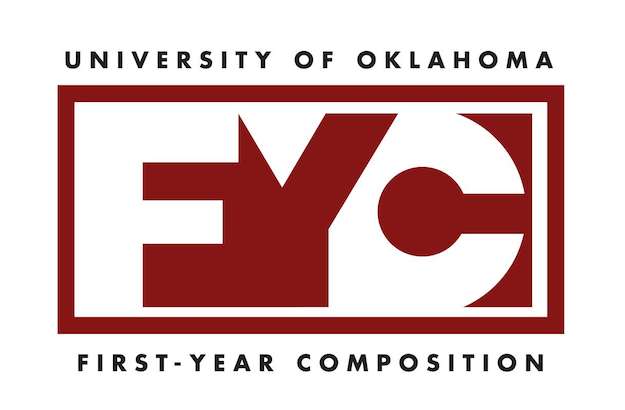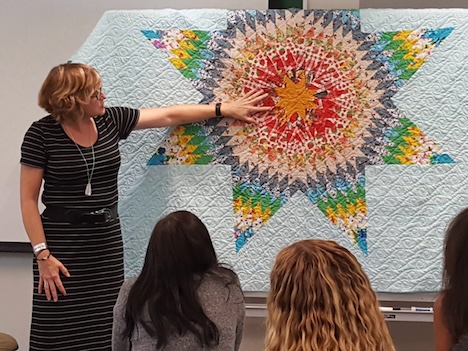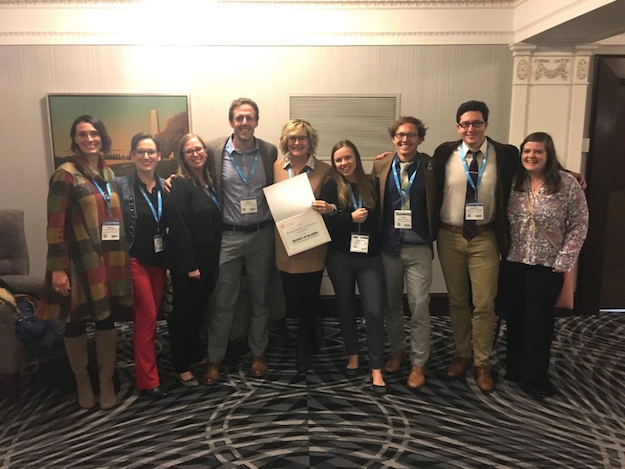
Rhetorical Education & The Engaged Citizen
On this page, you can learn more about our role as the First Year Composition office at OU, our guiding philosophy with a detailed description of how our award-winning curriculum approaches the teaching of writing through rhetorical education and with an emphasis on contributing to civil discourse, and the structure of our first-year composition program which is shaped by intentional design within and across English 1113 and English 1213 that allows our students to practice slow argumentation, using the skills that they develop for each project to inform the next, culminating in student arguments that are based in listening and understanding.


Rhetorical Education
Our philosophy begins with a commitment to rhetorical education. In 2013, William Keith and Roxanne Mountford (director of OU's FYC Program) penned the "The Mt. Oread Manifesto on Rhetorical Education 2013" in which they assert that rhetoricians from all disciplines must work together in order to give proper attention to civil discourse through a return to rhetorical education. In our contemporary moment, a united approach to rhetorical education is critical for preparing students for their role in public life.
The FYC curriculum is informed by this dedication. As they prepare both writing and speaking assignments, our students practice communication skills learned from across the disciplines. Building such skills allows them to become respectful and effective participants in civil discourse. OU's FYC curriculum works to help build a citizenship composed of indiividuals that are capable of rhetorically analyzing discourse and using that analysis to productively communicate in the public sphere.
Slow Argumentation
It seems that a great deal of the public arguments being made are not successful at persuading their intended audience. We think a significant piece of this problem is that arguments are made hastily, without first attempting to understand the nature of argument or the position of the arguing party. As such, people argue at different levels and seem to never reach a productive outcome.
We believe that slow argumentation can help solve this problem. By decelerating the process of argumentation, individuals can make more effective arguments because they have dedicated the time to prepare. This preparation does not simply mean accruing facts and figures that "prove" the arguing party's position; instead, slow argument demands a rhetorical approach to those with whom we might disagree.
We first ask students to analyze themselves, exploring what values motivate their positions and actions and allowing them to more readily recognize their own stake in issues of public importance. They then spend much of English 1113 and 1213 examining the perspectives, worldviews, and actions of those they disagree with and those that also have a stake in a selected public issue. Along the way, our curriculum emphasizes and practices concepts such as Krista Ratcliffe's rhetorical listening and stasis theory to offer students ways of exercising deliberation. The only projects in which students are asked to argue fall at the conclusion of our two-course sequence. Having spent nearly two semesters listening, delaying their argumentation, students are better able to construct arguments to particular stakeholders that are respectful and productive.
Civic Empathy
We want our students to leave our classes not only able to engage in critical inquiry and effective argumentation but able to understand the positions of others. Frequently, effective arguments are made that do not understand, or intentionally misunderstand, civic participants. While effective, such arguments owe their function to unethical rhetorical practices and do not elevate civil discourse. We strive for more.
In the process of slow argumentation, listening to others to understand rather than to defeat becomes a central priority. We choose to teach rhetorical practices that allow students to embrace the complexities of individuals, groups, and social issues in order to foster curiousity about the motivations of others. Emphaszing listening, we believe, creates the conditions for civic empathy to be achieved.
Assignment 1: students choose a personal value and explore its origins and development in their lives
Assignment 2: students use primary and secondary research to study how shared values motivate a local group's engagement with a social or political issue
Assignment 3: students analyze a text that represents a position different from their own to better understand the worldview of the author
Assignment 4: students give a 5-7 minute speech on a meaningful experience they had during the course
By the end of the course, students learn key skills, such as rhetorical listening and critical inquiry, that allow them to consider the worldviews that inform public arguments. By examining their own values, the values that inform groups, and the worldviews of those who they disagree with, students actively practice slowing down argumentation. Rather than arguing immediately with the "opposition," our student are taught to spend time listening to gain a better understanding of another's persepctive. The emphasis placed on understanding the motivations behind beliefs, opinions, and actions in English 1113 prepares students to continue with the slow argument process in English 1213.
Pitch: students give a 2 minute informal speech to their classmates in which they discuss a public issue that is important to them
Assignment 1: students research and rhetorically analyze the arguments made by key stakeholders in their chosen public issue, explaining the issue's current state and why it is unresolved
Assignment 2: students research the worldview of one indifferent or resistant stakeholder, creating a profile and a proposal for persuading that stakeholder in the next assignment
Assignment 3: students craft an argument to the stakeholder that they analyzed in the second assignment
Assignment 4: students give a 6-8 minute formal speech and a 2-minute Q & A in which they attempt to persuade their classmates on an aspect of their selected issue
Building on the skills acquired in English 1113, students continue to practice listening as they work toward intervening in a public issue. They spend time researching the complexity of their selected social or political issue, the move on to analyzing stakeholders in that issue. Using stasis theory as an analytical tool, students examine the arguments being made by stakeholders. Finally, students select a stakeholder that disagrees with them to try to persuade to think differently, relying on stasis theory to help craft their argument. By the end of the two-course sequence, students have completed the process of slow argument by taking the time to research the history and context of an issue as well as to listen to the stakeholders in that issue. Further, students learn to cultivate civic empathy, not by immediately approaching social issues in a combative manner but instead delaying argumentation for the sake of understanding. Students leave English 1213 better equipped to contribute to public discourse, having practiced a process that can lead to respectful communication and productive dialogue.

The University of Oklahoma’s First-Year Composition Program was selected to receive the Conference on College Composition and Communication’s 2017-2018 Writing Program Certificate of Excellence. Dr. Roxanne Mountford, Director of the FYC Program, and her team of past and present assistant directors, associate director, and two lecturers received the award in a ceremony in Kansas City, Missouri on March 16, 2018.
The selection committee, chaired by Scott Wible, noted, “OU’s FYC Program innovatively addresses the criteria associated with the award. The program exhibits dedication to excellent and responsive professional development and commitment to equity for various stakeholders; indeed, the committee found this program’s labor practices to be exemplary. The composition course outcomes and methods of instruction/assignment design exhibit best practices. Especially innovative is the way the program promotes ‘rhetorical education’ through ‘civic empathy.’ Assessment practices demonstrate comprehensive reflection in response to both quantitative and qualitative data.”
The award honors the significant investments in sustainable, high-quality instruction made by the College of Arts and Sciences at the request of the English Department, as well as the work of Mountford and her team. The changes to the program have been popular with both students and instructors. In FYC’s assessment of the curriculum, 94% of FYC students reported that they valued their learning experience, and 97% agreed that they were free to choose topics that interested them. Students also claimed that their course assignments prepared them to “respectfully engage in public discussions,” one of the core goals of the curriculum.
Our full application for the Writing Program Certificate of Excellence is available for those interested in more information about our program.